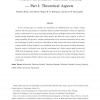Free Online Productivity Tools
i2Speak
i2Symbol
i2OCR
iTex2Img
iWeb2Print
iWeb2Shot
i2Type
iPdf2Split
iPdf2Merge
i2Bopomofo
i2Arabic
i2Style
i2Image
i2PDF
iLatex2Rtf
Sci2ools
CORR
2006
Springer
2006
Springer
Wireless Information-Theoretic Security - Part I: Theoretical Aspects
In this two-part paper, we consider the transmission of confidential data over wireless wiretap channels. The first part presents an information-theoretic problem formulation in which two legitimate partners communicate over a quasi-static fading channel and an eavesdropper observes their transmissions through another independent quasi-static fading channel. We define the secrecy capacity in terms of outage probability and provide a complete characterization of the maximum transmission rate at which the eavesdropper is unable to decode any information. In sharp contrast with known results for Gaussian wiretap channels (without feedback), our contribution shows that in the presence of fading informationtheoretic security is achievable even when the eavesdropper has a better average signal-to-noise ratio (SNR) than the legitimate receiver -- fading thus turns out to be a friend and not a foe. The issue of imperfect channel state information is also addressed. Practical schemes for wirel...
| Added | 11 Dec 2010 |
| Updated | 11 Dec 2010 |
| Type | Journal |
| Year | 2006 |
| Where | CORR |
| Authors | Matthieu Bloch, João Barros, Miguel R. D. Rodrigues, Steven W. McLaughlin |
Comments (0)

